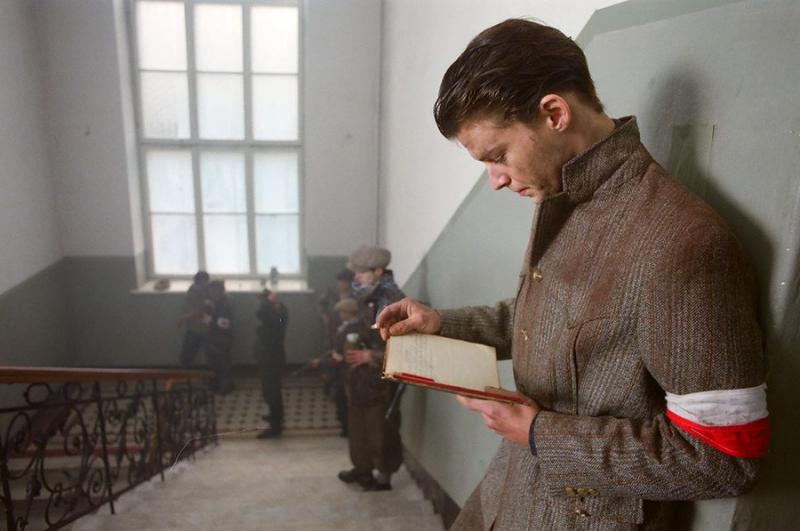Austin Polish Film Festival 2013: Baczynski, Baby Blues and Bikes

I knew going into Saturday's collection of Austin Polish Film Festival films that I was going to discover aspects of the country that were completely alien to me. This was never more true than when I attended the screening of Baczyński (pictured at top), a documentary/narrative focusing on the all-too-brief life of Polish poet Krzysztof Baczyński. The film tells the story of the invasion of Poland and a young soldier who finds escape from the battle and the bloodshed through poetry.
Part talking-head documentary and part narrative feature, the film particularly struck me with its cinematography. It would have been so easy to make the surroundings within the film as bleak as the events taking place, and yet the filmmakers put together such vivid colors and images that in a way it signified the indestructible beauty and spirit of the country. Meanwhile, the weaving of Baczyński's words alongside images of war and horror was really effective. I was most taken with the poems themselves, which called to mind those thoughtful and pensive moments that one wouldn't ordinarily attribute to times of war. I found it really moving that in spite of such times, this young poet never lost sight of what made his country great. Perhaps the greatest element of Baczyński was the intercut shots of Polish young people in the present day sitting in the audience as they took turns reciting Baczyński's own words, which still had meaning and resonance decades later.
While the poetry of the first film left me moved, the sheer cluelessness of the people in the second film, Baby Blues (Bejbi Blues), left me stunned. Natalia is a single teenage mother who lives with her own mother (herself a former teen mom) and has an on/off relationship with her boyfriend Kuba. While Natalia's own reasoning for having a baby comes from a longing to have someone in her life who loves her (it's pretty clear her mother has been emotionally MIA all her life and all but abandons her early on in the film), the fact remains that she is still indeed a child herself. To the character’s credit, she does exhibit genuine concern and emotion for her baby, even banning Kuba and his friend from the apartment after she finds they have been smoking pot around their son.
Natalia’s ultimate dream is to be a fashion model and exist purely in the world of fashion, and this more than shows itself in her everyday life, where she takes great care to embrace the most offbeat fashions and makeup. Though her later actions reveal her to be little more than a dumb kid, here the basis for Natalia’s obsession with fashion and appearance is obvious; it is the one area in her life where she has absolute control.
It was refreshing to enter Saturday evening with a screening of My Father's Bike (Moj Rower), a multigenerational story of fathers and sons. When 60-something Wlodzimierz's wife up and leaves him one morning, he ends up in the hospital, leading to a reunion between his famous pianist son Pawel and his boarding-school grandson Maciek. The reunion is one of mixed emotions, as Pawel has hatred toward his father and cluelessness toward his son, while Maciek has a strong kinship with his grandfather but loathes Pawel. Meanwhile, Wlodimierz, who has come to a definite impasse in life, tries to love them both. When the trio sets out to locate Wlodzimierz's wife, secrets come to light and events transpire that end up changing all three men.
I'm a sucker for a good family drama filled with tension, skeletons and long revelatory scenes of catharsis. Some might say that films such as My Father's Bike are a dime a dozen, and on a certain level they'd be right (Jane Fonda has starred in two or three of them within the last few years!), but I had to appreciate the fact that this film didn't play it safe in terms of actions and the overall fates of the characters. Nor did it opt for an all-around happy ending. Instead, it chose to follow real life with inevitable outcomes for each of the three men, each of whom found themselves transformed in one way or another.
A few momentary ventures into genre tropes aside, My Father's Bike was a truly moving, tear-inducing film that actually took the time to explore the relationship between fathers and sons as well as the universal struggles that exist and unite three very different generations.
Frank Calvillo is an Austin Film Society apprentice.

